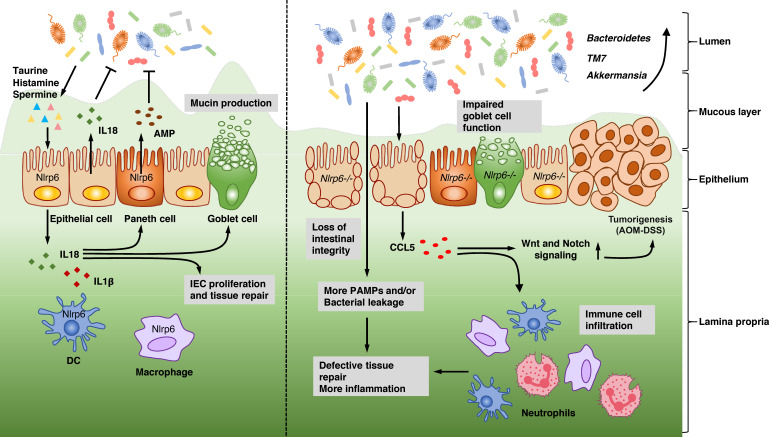Figure 1.
Mechanisms controlled by NLRP6 in regulating intestinal microbiota and the onset of intestinal inflammation as well as tumorigenesis. In normal physiological conditions, NLRP6 is expressed by both intestinal cells (such as epithelial cells, goblet cells, and Paneth cells) and hematopoietic cells (such as DCs and macrophages). The NLRP6 inflammasome regulates the secretion of IL-1β and IL-18, which play an important role in maintaining a homeostatic bacterial community and promoting epithelial cell proliferation, tissue repair, mucin production, and AMP secretion. Meanwhile, NLRP6 also inhibits canonical NF-κB and MAPK signaling in an inflammasome-independent manner. The metabolites produced by microbiota, such as taurine, histamine, and spermine, also modulate NLRP6-dependent IL-18 production and further help to maintain a healthy intestinal environment. In the absence of NLRP6, the intestinal microbiome is altered with an increase of potentially pathogenic species, such as Bacteroidetes, TM7, or Akkermansia. As IL-18 expression is abolished, goblet cell function is impaired, resulting in less mucin production along with defective epithelium repair, leading to the loss of intestinal integrity and the failure of defense against bacteria during acute inflammation induced by DSS challenge. CCL5 is induced by gut microbiota and increases immune cell infiltration together with promotion of epithelial cell proliferation, which is dependent on Wnt and Notch signaling, promoting cancer formation. IEC, intestine epithelial cell; PAMP, pathogen-associated molecular pattern.

